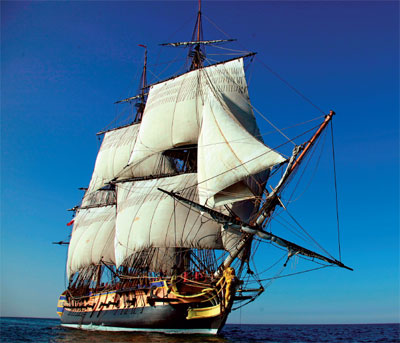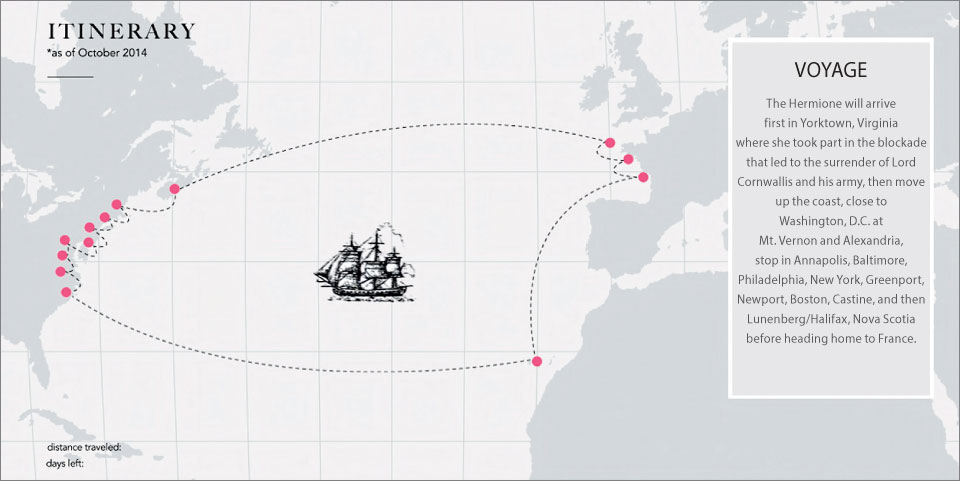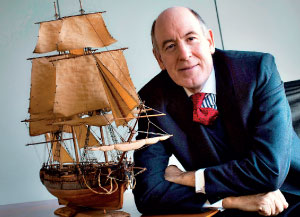Setting Sail
 By Kevin Gray | Photography Courtesy Association Hermione-Lafayette
By Kevin Gray | Photography Courtesy Association Hermione-Lafayette
“Every leak, every creak, each roll and pitch of her hull, the laughter of crew and the call of commands made my heart swell with the understanding that the dream had become real.”
The dream was recreating history in homage to two great historical figures—one made of flesh and bone, the other of oak and hemp and metal.
“As No. 1 helmsman of the four that it takes to steer her,” says Marc Jensen, director of maritime affairs for the Friends of Hermione-Lafayette in America, “I guided my co-helmswomen and men to make her glide at an angle up one side of the 30-foot seas and down the other with the grace of a ship one-tenth her size.”
The test voyages held last fall were preparation for the transatlantic voyage of the Hermione this spring. On the open seas the replica of the original sailing vessel passed her truest tests.
The Marquis described her as “sailing like a bird.”
“Every leak, every creak, each roll and pitch of her hull, the laughter of crew and the call of commands made my heart swell with the understanding that the dream had become real.”
“I agree,” says Jensen, who started sailing at the age of 9 on Long Island Sound, taught by his father and uncle. He’s sailed everything from a 1933 35-foot Crocker-designed ketch named Pole Star that won the Newport to Bermuda Race to a 1976 43-foot Gulfstar ketch. A member of Mystic Seaport since 1979, he says, “until I sailed aboard the Hermione this past fall, I had never worked a square rigger.”
SPRING LAUNCH
In April 2015—235 years after the Marquis set sail on the frigate Hermione—the ship’s voyage will be replicated in celebration and reverence for the man and his indomitable ocean steed.

The ship will set sail from the mouth of the River Charente, in Port-des-Barques, where Lafayette boarded the ship in March 1780. While Lafayette’s voyage took 38 days, the transatlantic crossing of the replica is expected to take 42 days before reaching Yorktown, Virginia.
Lafayette’s mission was to deliver a message notifying Gen. George Washington of France’s decision to join with the Americans in their fight against the British, an action that turned the tide of the Revolutionary War.
March 23-Sept. 11:
Lass Gallery, Skillman Library
May 29-Aug. 16:
New-York Historical
Society Museum
June 17-Sept. 27:
Boston AthenæumFor a timeline of the Hermione’s trip and other resources, see www.hermione2015.com.
“The Hermione allowed for a tipping point in the American war for independence,” says Miles Young, worldwide chairman and CEO, Ogilvy & Mather, who is president of Friends of Hermione-Lafayette in America. “Before then, France supported the rebels to a degree, but not with any significant force. When Washington received from Louis XVI the news of France joining their effort, he realized that the fortunes of war were changing.”
The Hermione was constructed by Asselin SAS, a French shipbuilder. It took 17 years and nearly $30 million to build. “The structure is a true masterpiece of carpentry,” says François Asselin, president.
“We built an exact replica of the ship that wrote an important page in our history.”
“The position was always that this would be an authentic replica,” says Young. “Fortunately, the plans of a sister ship survived, which allowed for an accurate reconstruction. In the execution of those plans, the sourcing of the oak and hemp, and the metal forging, for example, are all authentic.”
Asselin says the biggest challenges were finding and shaping the pieces of oak, which required approximately 3,000 trees, and maintaining the historical integrity of the ship and its building process. Trees that met specific criteria came from forests throughout France and were then fashioned according to traditional methods to the hull’s shape.
HAND-CRAFTED OVER DECADES
“It took 17 years with an average team of 12 timber framers,” Asselin says. “In the 18th century, it took less than a year using 300 workers. The structure, dimensions, and materials conform to the history almost 95 percent. In the 18th century, the standard system did not exist as today. We had to make compromises at the mounting plane and add bolts made of bronze that did not exist at the time. It was also necessary to add two engines…out of the harbor, the navigation is done entirely by sail.”

| Ports of Call | Lafayette-Sponsored Events |
|---|---|
| June 10-11 Alexandria, Va. | June 11 |
| June 16-17 Annapolis, Md. | June 16* |
| June 25-28 Philadelphia | June 27* |
| July 1-4 New York | July 2 |
| July 11-12 Boston | July 11* |
| *with President Alison Byerly | |
| For more info including registration information: alumni.lafayette.edu | |
—François Asselin
In the United States, the ship will make stops in ports with which the original Hermione had a connection or that have a political or maritime history, including, among others, Washington, D.C., Annapolis, Philadelphia, New York City, and Boston.
A celebration of the tall ship and various educational, historical, and cultural events will occur at each stop.
“This is an opportunity on both sides of the Atlantic to celebrate the man for whom our college is named,” says Diane Shaw, director of special collections and college archivist. “We are excited to provide some of our wonderful collection to several venues during the time the Hermione will be in America.”

Miles Young, president of Friends of Hermione-Lafayette in America
Prints, paintings, and manuscripts from Skillman Library’s Marquis de Lafayette Collection will be featured during exhibitions at New-York Historical Society and the Boston Athenæum.
In addition, Lafayette, a strategic partner with Friends of Hermione-Lafayette in America, will sponsor the Hermione during its stay in Philadelphia and host alumni events at five ports of call (see above). The College will also present an exhibit in Skillman Library of photographs of the ship’s construction, and host a speaker involved with the building of the ship. The exhibit will be mounted in late March and run through the summer.
“Lafayette College has a stupendous collection, and I think it’s absolutely fantastic the college is involved in the Hermione project,” Young says. “This is something that is very meaningful to our friends in France, and it will bring the items from the collection to the attention of a broader audience in France. We couldn’t be more grateful and appreciative of the help Lafayette has given us.”